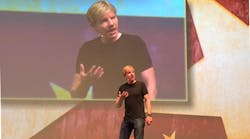Doing good is all about perspective.
In his keynote address “How to Make Your Efforts Count: Feeling Good v. Doing Good” at Safety 2015 in Dallas, author Bjorn Lomborg argued that the trick to creating effective and measurable change is in solving the right problems.
“We need to get a sense of what’s really the problem and what’s really the solution,” said Lomborg, who is a professor, statistician and author of “Cool It.”
He used global warming as an example.
“Yes, global warming is real,” he said, but urged attendees to have a sense of proportion.
While there will be an estimated 2,000 more heat-related deaths in the UK by 2050, there also will be an estimated 20,000 fewer cold-related deaths within the same timeframe.
And in countries like the United States, there hardly are any heat-related deaths because of the overwhelming adoption of air conditioning.
“If you want avoid old ladies dying of heat in Paris, France, give them air conditioning,” Lomborg said.
But solutions like air conditioning only solve a part of the problem and don’t really even address the real problem, he warned.
“If you want to help people, it’s about moving them out of poverty,” Lomborg said.
For example, the world’s largest environmental threat – indoor air pollution – is a problem of the poor, he said. Whereas outdoor air pollution, driven largely by use of fossil fuels, is a problem of the rich.
The solution to both issues, which are part of the larger problem of long-term sustainability and health, is in finding better energy.
And that’s not always a popular approach.
“We don’t burn fossil fuels to annoy Al Gore,” Lomborg said. “Fossil fuels provide everything we like about civilization – heat, cold, transport, food, electricity. “
The key in making that transition is technology; it’s about creating alternatives that are more attractive than the existing sources of energy. He pointed to the U.S. development of the shale industry, which while imperfect has drawn a lot of demand off of coal dependence.
“We need to be honest about this and say no the world is not magically switching over to green energy anytime soon,” Lomborg said. “But what we can do is make sure we switch sooner and more efficiently.”
